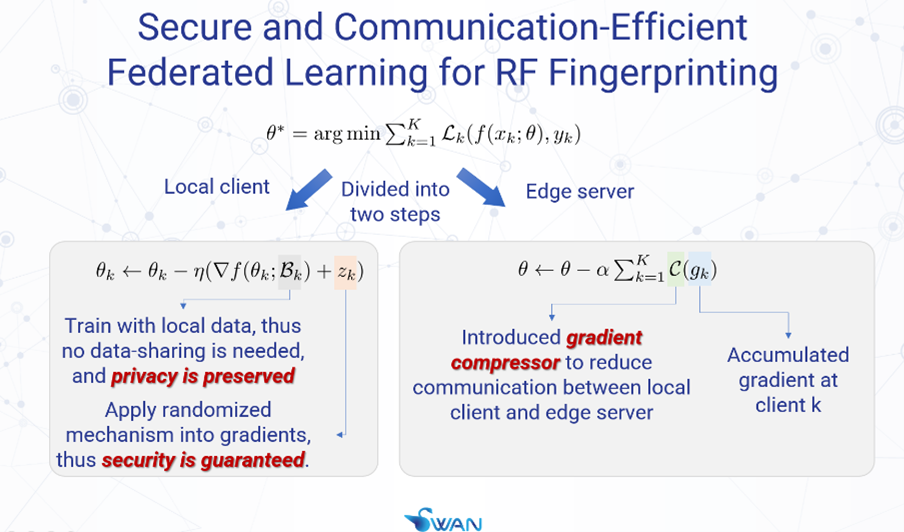Our spotlight blog series aims to highlight the work of our research team across the SWAN Prosperity Partnership, showcasing the contributions of our post-doctoral researchers, PhD students, academics, and industrial partners.
This time, we spoke to our newest team member, SWAN Senior Research Associate Dr Chuanting Zhang, who joined the University of Bristol in March 2022. We asked Chuanting a few questions about his work on using federated learning in the development of communication-efficient RF fingerprinting algorithms, and his background in machine learning for wireless traffic analysis.
What are your main research tasks within SWAN and how do these relate to your previous research experience?
My main research tasks in SWAN revolve around developing robust and communication-efficient RF fingerprinting algorithms under the scenario of federated learning.
My current research in SWAN is a natural and smooth extension of my previous work, which is machine learning for wireless traffic analysis. In my previous work, I developed both centralized and decentralized machine learning algorithms to solve the wireless traffic prediction problem. These algorithms have laid a solid foundation for RF fingerprinting using machine learning.
Can you give us a brief overview of the work you have been doing recently and how this relates to the SWAN Prosperity Partnership?
My current work is highly related to the SWAN’s programme objectives. I am trying to solve the RF fingerprinting problem for LoRaWAN at the edge using techniques from federated learning. Our aims are three-fold. First, we hope we can achieve RF fingerprinting with high accuracy by necessary data pre-processing and designing novel neural network architecture. Second, we hope our algorithm has a minimum communication cost between local clients (LoRa gateways) and the central server (LoRa application server) by using gradient/model compression techniques. Third, we hope our algorithm can guarantee data security during gradient/model transferring from local clients to central server by introducing differential privacy into our method.
Where does this work fit in with SWAN’s wider Research Challenges?
Since RF fingerprinting is mainly used for cyber security, my work largely fits in with SWAN’s second research challenge: Cyber Detection & Defence.

What will be the key outputs of this particular piece of work?
My research is a mix of theoretical and applied. Our theoretical results will be targeted for a conference/journal paper of IEEE, while our trained RF fingerprinting model will be applied and tested in our LoRaWAN network to verify its effectiveness and robustness.
How have SWAN’s partners in industry and government been involved in this work package?
SWAN’s partners have provided us with valuable suggestions and comments for our system model, algorithm design, and future research direction. In conjunction with our diverse partners, we aim to develop practical research and build secure communication systems that are beneficial to our world and human beings.
What are the next steps for this section of research?
We will first test the effectiveness of the top-k compression scheme to save communication overhead between local clients and the central server. Then we will find a way to improve prediction accuracy which is offset by gradient compression. After that, a decentralized RF fingerprinting model will be trained and deployed in our LoRaWAN network to verify our theory.
Can you tell us about any recent publications in the world of communication systems and networks research that have interested you?
The following two papers are excellent references for RF fingerprinting:
1) G. Shen, J. Zhang, A. Marshall and J. R. Cavallaro, "Towards Scalable and Channel-Robust Radio Frequency Fingerprint Identification for LoRa," in IEEE Transactions on Information Forensics and Security, vol. 17, pp. 774-787, 2022.
2) T. Jian et al., "Radio Frequency Fingerprinting on the Edge," in IEEE Transactions on Mobile Computing, doi: 10.1109/TMC.2021.3064466.
Is there anything else you would like to tell us?
I am always looking forward to cooperating with researchers from industry and academia. Together, let’s make future communication systems intelligent, secure, and robust.
SWAN Prosperity Partnership
SWAN is an EPSRC Prosperity Partnership project dedicated to the creation of Secure Wireless Agile Networks (SWAN) that are resilient to both cyber attacks and accidental or induced failures. The partnership is made up of contributors from the Smart Internet Lab at the University of Bristol, Toshiba Research Europe Ltd, GCHQ, and Roke Manor Research Ltd.
Interested in reading more about SWAN and our programme of research? Take a look at our website for more information or sign up to our newsletter for regular updates on SWAN activities and opportunities to get involved.

